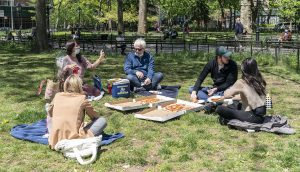New York, NY – May 10, 2020: Warning poster seen during sunny Mother’s Day amid COVID-19 pandemic in Hudson River Park (Photo: Lev Radin/Gildshire)
Everybody talks about “a new normal.” What does it mean? How will life look after the lockdown? We don’t know when but sometime in the future, we will go back to our life and daily obligations. We will return to our offices, go to restaurants, and go to houses of worship. What will that look like? Will it be the same?
Many will face the psychological trauma of living a life of isolation, job loss, uncertainty, isolation, and for some death of loved ones. All of it together will be enough trauma for a great mental health crisis.
Just like the virus, trauma does not disappear easily. For some, the current situation will remain in the form of nightmares, daydreams, and memories. What measures can we take?
Life After the Lockdown?

Life After Lockdown? – New York, NY – May 10, 2020: People enjoy sunny Mother’s Day amid COVID-19 pandemic in Washington Square Park (Photo: Lev Radin/Gildshire)
Experts believe that the current COVID-19 pandemic could inflict long-lasting trauma on a major worldwide scale. This makes sense when you consider that approximately 2.6 billion people are in some kind of lockdown. Professor of health psychology and primary care psychology at Vrije University Brussel, Elke Van Hoof believes that global lockdown is the biggest psychological experiment. He also believes that we will pay the price through a possible secondary epidemic wave in the second half of 2020. Elke Van Hoof cites a study from China where 28% of parents who were quarantined with their children had a diagnosis of trauma-related mental health conditions.
According to the study:
“In short, and perhaps unsurprisingly, people who are quarantined are very likely to develop a wide range of symptoms of psychological stress and disorder, including low mood, insomnia, stress, anxiety, anger, irritability, emotional exhaustion, depression and post-traumatic stress symptoms. Low mood and irritability specifically stand out as being very common, the study notes.”
Until we have a vaccine (which might be up to two years), people will be reluctant to return to their daily life as if nothing happened.
People who are under stress due to COVID-19 situations are experiencing rapid breathing, accelerated heart rate, and fatigue. After a long period of time, this can have a great impact on our thoughts and overall well-being, leading to depression and anxiety disorders.
Human contact is an important part of psychological health, especially during mourning for those who lost someone. However, with social distancing during the pandemic, loneliness and isolation can be prolonged after the quarantine is lifted. Without social support, many are at risk of prolonged grief disorder and complicated grief which are syndromes affecting around 15% of people. The symptoms of prolonged grief disorder are social withdrawal that can persist for decades, somatic distress, and depression.
What are the Possible Outcomes of Lockdown?

Life After Lockdown? -New York, NY – May 13, 2020: General view of Modell’s Sporting Goods store closed during COVID-19 pandemic on 7th Avenue (Photo: Lev Radin/Gildshire)
According to Miller-Karas, possible outcomes of lockdown are the following:
- Lingering risk of potential infection
- Fear of losing loved ones
- Financial insecurity
- Homeless families living on the streets or in their cars due to job loss
- Prolonged grief from the inability to properly mourn the death of loved ones
- After-effects of lockdown for families struggling with an alcohol issue, drug addiction or violence in the family
What Can you Do Now?
Take care of yourself! Eat healthy, rest, and have a regular exercise at home. When you take care of yourself, you have more to offer to others. Also, indulge yourself. Have a hot bath, schedule personal time for yourself, a hobby, reading, meditation, yoga, or whatever makes you happy. The most important thing right now is limiting your news feed and restrict COVID-19 media. Stay informed and keep up with the most relevant and up to date progress but avoid watching too much news on the pandemic.
Be safe and take care.




